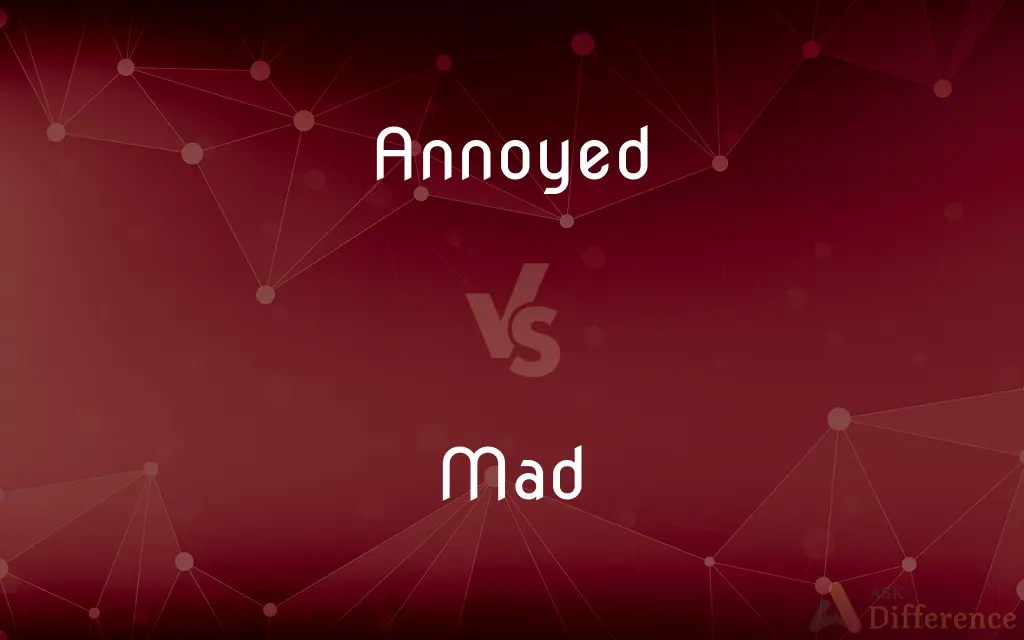Annoyed vs. Mad — What's the Difference?
By Tayyaba Rehman & Fiza Rafique — Updated on April 2, 2024
Annoyed describes mild irritation or frustration, while mad implies stronger feelings of anger or rage.

Difference Between Annoyed and Mad
Table of Contents
ADVERTISEMENT
Key Differences
Annoyance is a relatively mild form of discomfort, often arising from minor irritations or nuisances in daily life. It reflects a temporary state of displeasure that can usually be resolved or ignored with ease. On the other hand, being mad denotes a more intense emotional state, characterized by anger or rage that can stem from deeper or more significant sources of frustration or injustice.
While annoyance might be caused by everyday inconveniences such as a noisy environment or a small delay, the feeling of being mad is often triggered by actions or situations perceived as unjust, harmful, or deeply frustrating. The intensity of the emotions involved with being mad can lead to a more pronounced reaction, potentially including confrontational or aggressive behavior, whereas annoyance is more likely to result in mild complaints or temporary discomfort.
The duration and impact of these feelings also differ. Annoyance is typically short-lived and may not significantly affect one's mood or behavior beyond the immediate moment. In contrast, feeling mad can last longer and have a more substantial impact on an individual's thoughts, behaviors, and even physical health, due to the stress associated with intense anger.
In terms of expression, annoyance is often communicated through sighs, eye rolls, or brief mentions of displeasure. Conversely, expressions of being mad can include raised voices, physical expressions of anger, and more direct confrontations about the source of the anger. The response from others to these expressions also varies; annoyance is usually met with attempts to alleviate the minor irritation, whereas anger might prompt more serious attempts at conflict resolution or, in some cases, avoidance.
Despite these differences, both annoyance and anger are normal emotions that signal something in our environment needs attention or change. Recognizing and appropriately expressing these feelings is crucial for personal well-being and healthy relationships. It's important to identify the source of these emotions and address them constructively, whether they stem from minor annoyances or more significant sources of anger.
ADVERTISEMENT
Comparison Chart
Intensity
Mild irritation or frustration
Strong anger or rage
Causes
Minor inconveniences or nuisances
Perceived injustices or significant frustrations
Duration
Short-lived, usually transient
Can be prolonged, with a lasting impact
Impact
Minimal, often does not affect overall mood significantly
Significant, can affect behavior, mood, and physical health
Expression
Sighs, eye rolls, mild complaints
Raised voice, confrontational behavior, direct communication
Compare with Definitions
Annoyed
Mild Discomfort.
She felt annoyed by the constant background noise.
Mad
Lasting Impact.
Being mad about the incident affected his concentration all day.
Annoyed
Minimal Impact.
Despite his annoyance with the mistake, he quickly moved on.
Mad
Intense Anger.
He was mad after being falsely accused.
Annoyed
Temporary State.
His annoyance at the delay was short-lived once he started reading.
Mad
Deeper Emotional Response.
She stayed mad for hours, unable to shake off her anger.
Annoyed
Caused by Daily Irritations.
Getting stuck in traffic left her feeling slightly annoyed.
Mad
Triggered by Significant Issues.
The unfair treatment at work made him really mad.
Annoyed
Expressed Subtly.
She showed her annoyance with an eye roll.
Mad
Expressed Directly.
They expressed their madness through a heated argument.
Annoyed
To cause irritation to (another); make somewhat angry.
Mad
Mentally ill; insane
He felt as if he were going mad
Annoyed
(Archaic) To harass or disturb by repeated attacks.
Mad
Very angry
Don't be mad at me
Annoyed
Simple past tense and past participle of annoy
Mad
Great; remarkable
This author has mad skills with the written word
I got mad respect for him
Annoyed
Troubled, irritated by something unwanted or unliked (an annoyance); vexed.
Mad
Very; extremely
He was mad cool—we immediately hit it off
Annoyed
Aroused to impatience or anger; as, feeling annoyed by the constant teasing.
Mad
Make (someone) mad
Had I but seen thy picture in this plight, it would have madded me
Annoyed
Troubled persistently especially with petty annoyances.
Mad
Angry; resentful
Was mad about the broken vase.
Annoyed
Aroused to impatience or anger;
Made an irritated gesture
Feeling nettled from the constant teasing
Peeved about being left out
Felt really pissed at her snootiness
Riled no end by his lies
Roiled by the delay
Mad
Mentally deranged
"afflicted with hypochondria, depression, and fear of going mad" (Carla Cantor).
Annoyed
Troubled persistently especially with petty annoyances;
Harassed working mothers
A harried expression
Her poor pestered father had to endure her constant interruptions
The vexed parents of an unruly teenager
Mad
Characteristic of mental derangement
Mad laughter.
Mad
Temporarily or apparently deranged by violent sensations, emotions, or ideas
Was mad with jealousy.
Mad
Lacking restraint or reason; foolish
I was mad to have hired her in the first place.
Mad
Feeling or showing strong liking or enthusiasm
Mad about sports.
Mad
Marked by a lack of restraint, especially by extreme excitement, confusion, or agitation
A mad scramble for the bus.
Mad
Exhibiting uncharacteristic aggressiveness, especially as a result of rabies, spongiform encephalopathy, or another neurological disease. Used of animals
A mad dog.
A mad cow.
Mad
Excellent; wonderful
It's really mad that they can come.
Mad
Abundant; great
Mad respect.
Mad
To make or become mad; madden.
Mad
Extremely; very
This place is mad cool.
Mad
Insane; crazy, mentally deranged.
You want to spend $1000 on a pair of shoes? Are you mad?
He's got this mad idea that he's irresistible to women.
Mad
Angry, annoyed.
Are you mad at me?
Mad
Bizarre; incredible.
It's mad that I got that job back a day after being fired.
Mad
Wildly confused or excited.
To be mad with terror, lust, or hatred
Mad
Extremely foolish or unwise; irrational; imprudent.
Mad
Extremely enthusiastic about; crazy about; infatuated with; overcome with desire for.
Aren't you just mad for that red dress?
Mad
(of animals) Abnormally ferocious or furious; or, rabid, affected with rabies.
A mad dog
Mad
Intensifier, signifying abundance or high quality of a thing; very, much or many.
I gotta give you mad props for scoring us those tickets.
Their lead guitarist has mad skills.
There are always mad girls at those parties.
Their lead guitarist has mad skills.
There are always mad girls at those parties.
Mad
(of a compass needle) Having impaired polarity.
Mad
Intensifier; to a large degree; extremely; exceedingly; very; unbelievably.
He was driving mad slow.
It's mad hot today.
He seems mad keen on her.
Mad
To be or become mad.
Mad
To madden, to anger, to frustrate.
Mad
Disordered in intellect; crazy; insane.
I have heard my grandsire say full oft,Extremity of griefs would make men mad.
Mad
Excited beyond self-control or the restraint of reason; inflamed by violent or uncontrollable desire, passion, or appetite; as, to be mad with terror, lust, or hatred; mad against political reform.
It is the land of graven images, and they are mad upon their idols.
And being exceedingly mad against them, I persecuted them even unto strange cities.
Mad
Proceeding from, or indicating, madness; expressing distraction; prompted by infatuation, fury, or extreme rashness.
Mad wars destroy in one year the works of many years of peace.
The mad promise of Cleon was fulfilled.
Mad
Extravagant; immoderate.
Mad
Furious with rage, terror, or disease; - said of the lower animals; as, a mad bull; esp., having hydrophobia; rabid; as, a mad dog.
Mad
Angry; out of patience; vexed; as, to get mad at a person.
Mad
Having impaired polarity; - applied to a compass needle.
Mad
To make mad or furious; to madden.
Had I but seen thy picture in this plight,It would have madded me.
Mad
To be mad; to go mad; to rave. See Madding.
Festus said with great voice, Paul thou maddest.
Mad
An earthworm.
Mad
Roused to anger;
Stayed huffy a good while
She gets mad when you wake her up so early
Mad at his friend
Sore over a remark
Mad
Affected with madness or insanity;
A man who had gone mad
Mad
Marked by uncontrolled excitement or emotion;
A crowd of delirious baseball fans
Something frantic in their gaiety
A mad whirl of pleasure
Mad
Very foolish;
Harebrained ideas
Took insane risks behind the wheel
A completely mad scheme to build a bridge between two mountains
Common Curiosities
How should I deal with feeling mad?
Addressing the root cause, communicating feelings constructively, and practicing stress-relief techniques can help manage anger.
Is it unhealthy to feel annoyed or mad?
While both are normal emotions, persistent or intense anger can be harmful to physical and mental health and should be addressed.
What actions might someone take when they're mad?
Actions can range from arguing and shouting to seeking resolution for the issue that caused the anger.
What does being mad imply?
Being mad implies experiencing strong feelings of anger or rage, often in response to something perceived as unjust or deeply frustrating.
Can annoyance turn into anger?
Yes, if minor irritations are persistent or accumulate, annoyance can escalate into anger.
How can I differentiate between being annoyed and mad?
The intensity of the emotional response and the significance of the trigger can help differentiate between annoyance and anger.
Are there benefits to feeling annoyed or mad?
These emotions can signal that something needs attention or change, serving as a catalyst for action.
How can I prevent minor annoyances from escalating into anger?
Recognizing triggers, maintaining perspective, and addressing issues early can help prevent escalation.
What does it mean to be annoyed?
Being annoyed refers to experiencing mild irritation or frustration due to minor inconveniences or nuisances.
Can how I express annoyance or anger affect others?
Yes, expressions of annoyance or anger can impact relationships and should be communicated in a healthy and constructive manner.
What role does communication play in resolving feelings of anger?
Effective communication is key to resolving the underlying issues causing anger and preventing escalation.
How can I help someone who's feeling mad?
Listening, offering support, and helping to address the source of their anger can be beneficial.
What are common triggers for feeling annoyed?
Common triggers include minor delays, noise, or small mistakes by others.
Is it better to suppress anger?
Suppression can lead to increased stress and health issues; it's healthier to find constructive ways to express and address anger.
Can external factors influence how quickly I become annoyed or mad?
Yes, factors like stress, sleep deprivation, and personal issues can lower tolerance levels, making one more prone to annoyance or anger.
Share Your Discovery

Previous Comparison
Carefree vs. Intense
Next Comparison
Dense vs. HeavyAuthor Spotlight
Written by
Tayyaba RehmanTayyaba Rehman is a distinguished writer, currently serving as a primary contributor to askdifference.com. As a researcher in semantics and etymology, Tayyaba's passion for the complexity of languages and their distinctions has found a perfect home on the platform. Tayyaba delves into the intricacies of language, distinguishing between commonly confused words and phrases, thereby providing clarity for readers worldwide.
Co-written by
Fiza RafiqueFiza Rafique is a skilled content writer at AskDifference.com, where she meticulously refines and enhances written pieces. Drawing from her vast editorial expertise, Fiza ensures clarity, accuracy, and precision in every article. Passionate about language, she continually seeks to elevate the quality of content for readers worldwide.
















































